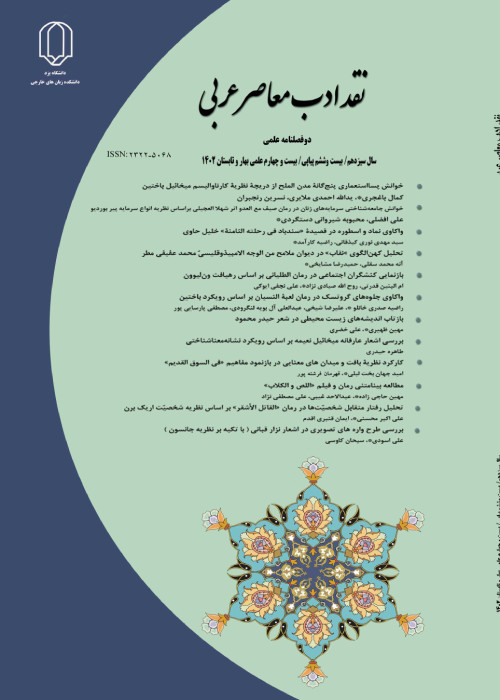The semiotics of the title in Saadi Yousef's Layali-e-Kolha anthology based on Saussure's semiotic approach
and analyzing the relationship between signs and their meanings. Semiotic analysis is a useful for practicing a new way of reading. In modern poetry, naming poems is one of its structural dimensions, is considered as a complementary element for the poem’s message, and plays a unique role in preparing the audience for communication with the text. Therefore, the title as a linguistic sign is the identity and introduction of the poem, and the semiotics of the title can greatly help to analyze the poem. Saadi Yusuf, a contemporary Iraqi poet, is one of those whose poems are named intelligently and based on the structural logic that governs the entire text such that the titles of his poems can be categorized based on specific criteria. Thus, the title in Yousuf's poems is not a marginal element, but a fundamental component, and it is not less important than the text. The aim of this study is to answer the following questions after dealing with the semiotics of the title in the anthology "Al-Layali Kolloha: Al-A'mal Al-Shari'ah" by Saadi Yusuf:- What was the poet’s method of choosing the titles of his poems?- According to Saussure's theories, what kind of relationship do the titles of Yusuf's poems have with the text?
In this research, based on the descriptive-analytical method and Saussure's view, the semiotics of the titles has been studied in Yusuf's Al-Layali Kollohah collection. For a new understanding of Saadi Yusuf's poems, the present study examines five poems from his anthology with the titles Zahran and Eli Abd al-Wahhab al-Bayati. Considering the subject of this study into account, the poems are selected in such a way as to include the most indications related to the titles.
Saadi Yousuf is one of those poets whose poems have been named intelligently and based on the structural logic of the whole text of the poem. The most important methods that he has used in naming titles are recalling the past or the elements that indicate them, choosing nostalgic or Western-related titles, selecting titles that indicate unknown places or persons, dedicating titles to the political suffocation issue and the use of numbers.The poet has produced meaning with the help of successor and companion relations and thus has created a large lexical system around the desired meanings. The titles of the poems have been so cleverly chosen that they are closely related to the original text and, in many cases, are in parallel with the original text to strengthen its meanings. Throughout the poem, the poet tries to expand the concise meaning of the title, and thus the text is a translation of the title and the title is a brief introduction to the text. In the poem "Amro_Be_Lghelghabz", Saadi Yusuf has used signs related to political obstruction and suffocation. The title is also chosen in a way that it attracts the audience's attention. After obtaining the meanings of the words "Amr" and "Elghaelghabz", one can find words in the text that are reinforced by these signs. These signs, like in Saadi Yousuf's other poetic titles, have the role of reinforcing the meaning of the title. Moreover, the text itself is composed of a set of signs that revolve around the subject of "tyranny and repression" through succession. The poem "Legha_Maa_Rajol" regards meeting a person who is unknown, and this has encouraged the audience to enter the text. What makes the ambiguity in the poem clear is the key substitute words in the title in the vertical axis of the text, which helps to untie the title knot. By being careful in the text of the poem, we can find many signs that strengthen the meaning.The title of the poem "Al-Salban Al-Khamsa", like most of Saadi Yusuf's titles, has a provocative and encouraging function. In terms of the semiotic aspects, finding the lexical system of the words "al-Salban" and "al-Khamsa" and explaining the context of the text can be of great help in deciphering the title. In such a context, Yusuf depicts the "sorrow", "simplicity", "fatigue", "loneliness" and "greenness" of the lover in the form of five crosses and fears that will destroy him. Thus, the whole text is full of signs that revolve around the "subject of fear of loneliness" in a syntagmatic form. The poem "Arza Zahran" reflects the desire to return to the past. The word "Arz" can be associated with many words through succession, such as the words "homeland", "root", "homelessness", "enthusiasm", "past" and "memory".The main text of the poem in the axis of succession is composed of a collection of signs that revolve around the "return to the glorious past". In the poem "Eli Abd al-Wahhab al-Bayati" one can also find many signs related to the title. They are consistent with the intellectual and ideological character of al-Bayati.
The results of the research indicate that the poet has chosen the titles of his poems by using methods such as calling for the past civilizations, nostalgic issues, names of places or unknown people, presenting poems, surreal images as well as using numbers and topics related to tyranny. The smart choice of titles is such that it moves alongside the original text and, with the help of succession, strengthens its signs. Therefore, the semantic atmosphere of the title throughout the poem has been strengthened and the poet constantly strives to achieve its ideal. This endeavor eventually leads to the production of new meanings by relating the title and the text and creating an in-text network of meanings through syntagmatic relations.
Semiotics , Titles , Saussure , Saadi Yusuf
- حق عضویت دریافتی صرف حمایت از نشریات عضو و نگهداری، تکمیل و توسعه مگیران میشود.
- پرداخت حق اشتراک و دانلود مقالات اجازه بازنشر آن در سایر رسانههای چاپی و دیجیتال را به کاربر نمیدهد.



